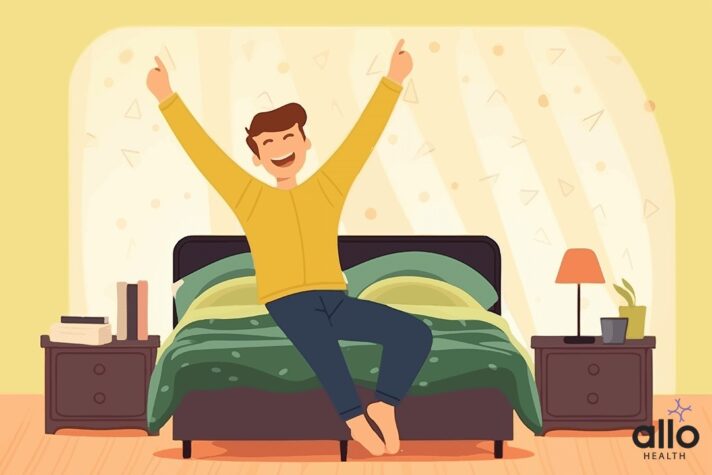Exploring the Science and Benefits of Masturbating Before Sleep

Allo Health is dedicated to personalized well-being, offering support and trusted information tailored to individual health goals. The platform emphasizes human-generated content, led by a distinguished medical team of experts, including physicians and sexual health specialists. Their commitment to credibility involves rigorous fact-checking, authoritative research, and continuous updates to ensure accurate, up-to-date information. Allo Health's unique approach goes beyond conventional platforms, providing expert-led insights and a continuous commitment to excellence, with user feedback playing a crucial role in shaping the platform's authoritative voice.

Dr.Sushma.V completed MBBS degree from BGS GIMS,bangalore
Why This Was Upated?
Our experts continually monitor the health and wellness space, and we update our articles when new information became available.
Updated on 16 March, 2024
- Article was updated as part of our commitment to diversity, equity, and inclusion.

"The following blog article provides general information and insights on various topics. However, it is important to note that the information presented is not intended as professional advice in any specific field or area. The content of this blog is for general educational and informational purposes only.
Book consultation
The content should not be interpreted as endorsement, recommendation, or guarantee of any product, service, or information mentioned. Readers are solely responsible for the decisions and actions they take based on the information provided in this blog. It is essential to exercise individual judgment, critical thinking, and personal responsibility when applying or implementing any information or suggestions discussed in the blog."
Delving into the realm of human physiology and psychology, this article explores the often-overlooked practice of masturbating before sleep. As a natural and common phenomenon, the act of self-pleasure before bedtime holds intriguing implications for both physical and mental well-being. Engaging in masturbation can trigger the release of beneficial hormones, contributing to improved health and mood for many individuals.
However, it’s important to recognize that some people may not have entirely positive experiences with it. Online resources often provide various suggestions for achieving better sleep, ranging from traditional methods like taking a warm bath or reducing alcohol intake to more contemporary suggestions like self-pleasure or masturbation. In this article, we’ll delve into the scientific explanations behind self-pleasure and its potential impacts on sleep quality.
What is Masturbation?
Self-pleasure, also known as masturbation, involves stimulating genital or sensitive areas for sexual gratification, irrespective of gender, age, or relationship status. It’s a natural aspect of healthy sexual exploration, facilitating pleasure and climax (orgasm). Techniques vary, including clitoral stimulation, the use of sex toys, or exploring erogenous zones like nipples or testicles.
Lubricants can enhance comfort, while erotic materials or fantasies may aid arousal. Masturbation is a personal choice, adaptable to individual preferences and circumstances. It can be a solitary activity or shared with a partner, regardless of one’s love and relationship status. Whether single or in a partnership, masturbation remains a common practice, promoting sexual well-being and self-awareness.
Hormones Releases During Masturbation
Engaging in masturbation triggers the release of various hormones within your body, contributing to several physiological effects:
- Dopamine: Recognized as one of the “happiness hormones,” dopamine is intricately linked to the brain’s reward circuitry.
- Endorphins: These natural pain-relievers also possess stress-reducing and mood-enhancing properties.
- Oxytocin: Often referred to as the “love hormone,” oxytocin fosters social bonding.
- Testosterone: Vital for enhancing stamina and arousal during sexual activity, testosterone is also released during sexual fantasies, as evidenced by a 2011 study.
- Prolactin: Not only crucial for lactation, prolactin also influences mood regulation and supports the immune system.
The act of masturbation facilitates the release of optimal levels of these hormones, thereby contributing positively to both mental well-being and physical health.
Relationship Between Sexual Release and Deep Sleep
- Sexual release has been linked to improved sleep quality, particularly deep sleep stages.
- During orgasm, the body releases oxytocin and endorphins, which promote relaxation and a sense of well-being, conducive to falling asleep.
- The release of prolactin after orgasm also contributes to feelings of relaxation and sleepiness.
- Deep sleep is crucial for physical and mental restoration, including muscle repair, memory consolidation, and hormone regulation.
- Research suggests that individuals who engage in sexual activity before bedtime often experience longer periods of deep sleep.
- The calming effects of sexual release may help reduce stress and anxiety, common barriers to falling asleep.
- While individual experiences may vary, incorporating sexual activity into a bedtime routine could potentially improve sleep quality and overall well-being.
Understanding Compulsive Sexual Behavior
Compulsive sexual behavior, characterized by repetitive and difficult-to-resist actions, can manifest in excessive masturbation. This phenomenon is often referred to as sex addiction or hypersexuality. Signs of this behavior include neglecting work obligations, canceling social engagements, or failing to fulfill responsibilities due to excessive masturbation. Moreover, this habit can detrimentally impact romantic relationships.
If you recognize these signs in yourself, seeking talk therapy could be beneficial. A trained counselor or therapist can assist you in addressing and managing your compulsive behavior. Additionally, exploring alternative activities to occupy your time and replace the urge to masturbate may be helpful. Engaging in activities such as reading, journaling, walking, or jogging can provide healthier outlets for managing impulses.
Conclusion
Engaging in self-stimulation before bedtime may aid in achieving a more restful sleep due to the release of relaxing and mood-enhancing chemicals during orgasm. Believing in its sleep-inducing effects can expedite the process. Conversely, arousal-induced chemicals may leave some feeling energized, impeding sleep. Notably, relaxation and happiness induced by orgasm don’t directly correlate with sleepiness. Melatonin, the hormone responsible for sleepiness, operates independently of sexual activity. Its production is influenced by factors like light exposure and sleep routines. Explore methods to enhance melatonin levels for improved sleep quality, alongside other tips to optimize your sleep routine for better rest.
Most Asked Questions
-
What is the science behind masturbating before sleep?
The article explores how engaging in masturbation before sleep can release endorphins and oxytocin, promoting relaxation and potentially aiding in falling asleep faster.
-
Are there any proven benefits to masturbating before bedtime?
Yes, the article discusses various benefits such as stress reduction, improved mood, and potentially enhanced sleep quality due to the release of feel-good hormones during masturbation.
-
Does masturbating before sleep have any impact on sleep quality?
Research suggests that the relaxation and hormonal release associated with masturbating before sleep may contribute to better sleep quality for some individuals, although individual experiences may vary.
-
Are there any potential downsides to masturbating before bedtime?
While there aren't significant downsides reported in the article, individuals should be mindful of excessive stimulation disrupting sleep patterns or any negative psychological effects.
-
Can masturbating before sleep be a healthy part of one's bedtime routine?
According to the article, for many individuals, incorporating masturbation into their bedtime routine can be a healthy way to relax, destress, and potentially improve sleep quality, but as with any behavior, moderation and individual preferences should be considered.






































